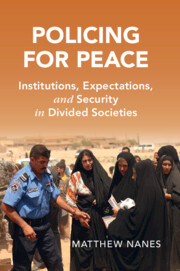Book contents
- Frontmatter
- Contents
- List of Figures
- List of Tables
- Preface
- Acknowledgments
- 1 Introduction: The Challenge of Institution-Building in Divided Societies
- 2 Power Sharing, Policing, and Peace
- 3 Sectarianism and Conflict in the Iraqi Police
- 4 Identity and Inclusion in the Israeli Police
- 5 Perceptions
- 6 Police Integration and Anti-Government Violence
- 7 Citizen Cooperation and Crime
- 8 Barriers to Integration
- 9 Conclusion: Peace-Building through Institutional Inclusion
- Appendix A Data and Methods
- Bibliography
- Index
- Seriespage
3 - Sectarianism and Conflict in the Iraqi Police
Published online by Cambridge University Press: 12 November 2021
- Frontmatter
- Contents
- List of Figures
- List of Tables
- Preface
- Acknowledgments
- 1 Introduction: The Challenge of Institution-Building in Divided Societies
- 2 Power Sharing, Policing, and Peace
- 3 Sectarianism and Conflict in the Iraqi Police
- 4 Identity and Inclusion in the Israeli Police
- 5 Perceptions
- 6 Police Integration and Anti-Government Violence
- 7 Citizen Cooperation and Crime
- 8 Barriers to Integration
- 9 Conclusion: Peace-Building through Institutional Inclusion
- Appendix A Data and Methods
- Bibliography
- Index
- Seriespage
Summary
This chapter provides an overview of policing in modern Iraq, with a special focus on the role of sectarian identity in citizen–police relations. Following the 2003 US invasion and the overthrow of Saddam Hussein, the transitional government initially purged Sunnis from the state security forces. However, the government soon faced domestic and international pressures to reintegrate Sunnis into the police as a counterinsurgency measure. In some areas like Anbar and parts of Baghdad, these pressures led to substantial inclusion of Sunnis in the police. In other areas, local politicians resisted Sunni integration so they could distribute police jobs as political patronage. Drawing on interviews with Iraqi citizens, I show just how salient the police’s makeup is to ordinary citizens’ relationships with the state. Citizens see access to positions in the police as a path toward empowerment and, at times, self-preservation. At the same time, they perceive that officers behave differently depending on their sect, with shared identity smoothing interactions between citizens and the police.
- Type
- Chapter
- Information
- Policing for PeaceInstitutions, Expectations, and Security in Divided Societies, pp. 42 - 66Publisher: Cambridge University PressPrint publication year: 2021

